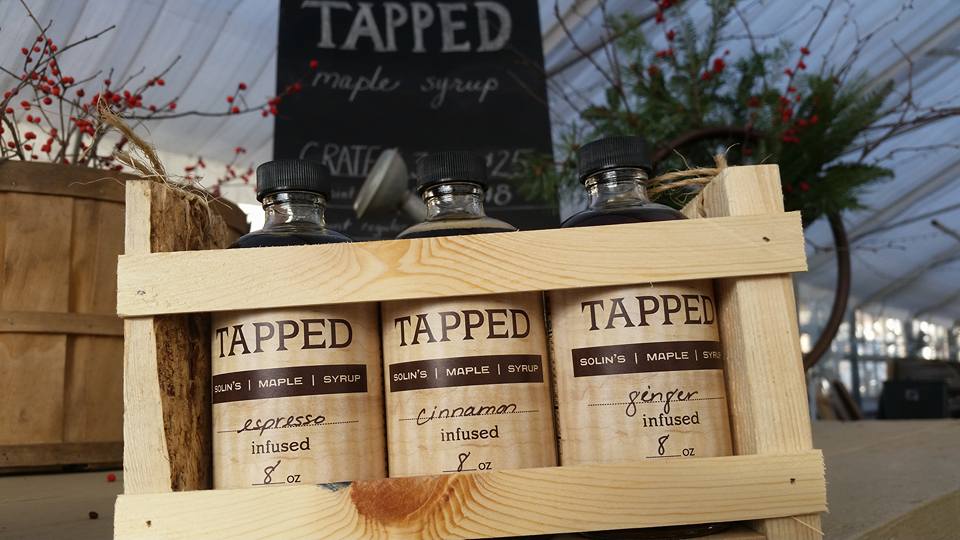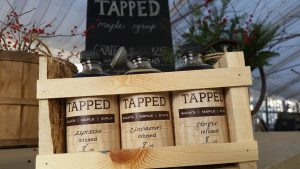
Solin’s Tapped Maple Syrup LLC Offers ‘Small Batch’ Products, with a Few Twists
“Small batch,” a term made popular by craft brewers and bourbon-makers, has come to the sugarbush.
As the sugaring season arrives— stubbornly slow—across the northwoods, Jeremy Solin has resurrected the Solin family sugarbush on Highway V north of Antigo as Tapped Maple Syrup LLC. He co-owns the business with his wife, Abi, offering maple syrup with a twist.
“We start with our maple syrup and add high quality ingredients to infuse different favors before filtering out those ingredients prior to bottling,” Solin said, with current varieties including cardamom, cinnamon, espresso, ginger, red pepper and turmeric.
“We just keep playing around with flavors,” Solin said, “and similar to regular maple syrup, these can be used to mix craft cocktails, flavor warm breakfast cereals, sweeten coffee or tea to substitute for processed sugar in any recipe.”
Solin has also found supplier for aged whiskey barrels, which still contain remnants of the liquor known as the devil’s cut, which he has begun to use to infuse remarkable syrup with an just a bit of an edge.
“We age the maple syrup for six months in Great Northern Distillery whiskey barrels,” Solin said. “It gives it a rich oaky and butterscotchy undertones.”
The Solins have been tapping trees for generations at the base of the glacial moraine north of Antigo, traditionally using the own time between winter and summer tree work for sapping and sugaring. But they had been out of commercial production when Solin, along with his dad, Dave, and other family members decided to fire up the equipment and create Tapped.
They do it the old-fashioned way, hanging about 800 five gallon buckets on taps scattered throughout their maples, including some assive trees and one even known as “The Grandfather.”
“We don’t use vacuum suction on our trees so we are even more dependent on good conditions to produce sap,”Solin said, suggesting the jury is still out on whether the suction will damage the trees over the years. “If things go well, we can expect to collect about 10 gallons of sap from each tap.”
There are a few bows to modernization. The sap is run through a reverse osmosis system, which removes some of the water and then cooked over a wood-fired midsize Waterloo stainless steel evaporator with a ventilation hood.
That’s far different from the old days of cooking in a flat pan or the family’s massive old, wood-eating evaporator of years past.
When the product ready— hopefully about 200 gallons— it will be drawn off and about half will be bottled as pure maple syrup. The rest will be either be placed in five gallon buckets for infusion with the various flavors or sealed in the whiskey barrels for aging before final filtering and bottling.
Solin, employed by the University of Wisconsin-Extension, and is co-founder of Farmshed in Stevens Point, a 35,000 square foot community food center with a production greenhouse, commercial kitchen, gathering center and more. The focus is on growing food in a sustainable manner while preserving local agricultural heritage and protecting natural resources.
Tapped offers a perfect compliment.
“Every sugarbush, and really every tree, produces unique maple syrup,” Solin said. “The quality and grade of maple syrup is also influenced by the cooking process. We tend to produce dark, rich and smokey-flavored syrup.”
In July, Solin was the recipient of a $2,000 award from Hatch, a community based startup pitch platform to help develop “napkin” ideas into early-stage companies. He won completing against a variety of central Wisconsin businesses after making a five-minute pitch about Tapped to a judging panel.
“There is a lot of opportunities for growth in maple syrup,” Solin said. “However that will probably not be seen in commodity maple syrup. I see the potential in specialty maple products.”
Tapped syrup is available at Sweet Tyme coffee shop and will be at Grandview Orchard when it opens later this season. It may also be ordered through the sugarbush’s Facebook page.
Regular syrup is priced at $17 a quart; $9 a pint and $5.50 per half-pint. Infused varieties are $15 pint and $8 a half-pint. Whiskey barrel-aged will sell for $12 per halfpint.
Solin said the small batch syrup is the perfect way to carry on a tradition that dates back generations.
“This is an amazing time of year to be out in the woods, and making maple syrup is one of the best ways to experience it,” he said. “And, in some small way, pouring that delicious syrup onto your pancakes or into a drink allows all who consume it a connection to the magic of the spring forest.”
Source: Antigo Daily Journal

